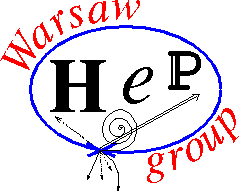SEMINARIUM FIZYKI WIELKICH ENERGII
Dnia 26 kwietnia (piątek) o godzinie 10:15, w sali B2.38 odbędzie się seminarium, na którym zostanie wygłoszony referat pt.:
„The future of multidimensional phase space in collider physics”
Referuje: dr Alibordi Muhammad (IFD UW)
The Large Hadron Collider is consistently increasing the luminosity and the energy. This will help the experimentalists to search for new physics beyond the standard model. Simultaneously this high amount of data requires a much more sophisticated data analysis approach. It requires a deeper understanding of the problem both in statistical and computational sense than ever before. This talk will make a surface level review of some of these aspects.
Serdecznie zapraszamy
dr hab. Katarzyna Grzelak
prof. dr hab. Aleksander Filip Żarnecki

